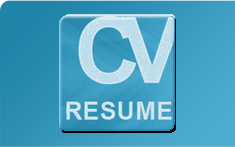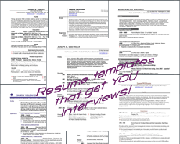
CV-Resume content
How to make a CV-Resume
Resume cover letter
Personal Branding
CV-Resume: content
OBJECTIVE SECTION
- Optional, but highly recommended.
• Include type of position or occupational field you wish to enter, skills, experience, and background you have to offer, and any special interests or areas of focus.
EDUCATION SECTION
• List institution name, post secondary degree(s) received and dates earned or expected
• Include major, minor, area of concentration, specialization, or certifications.
• List city & state when looking outside of state where employers may be unfamiliar with your college location.
• Don’t include institutions you attended, but didn’t receive a degree from, GPAs under 3.0, and years enrolled.
• This category may be a separate section or divided into subsections depending on the information presented.
• May include relevant courses and skills/knowledge learned, special projects, G.P.A. if over 3.0, honors, awards, scholarships, thesis, research projects, percent of college expenses earned, extracurricular activities.
EXPERIENCE SECTION
– Required.
• List paid and unpaid experiences, internships, co-ops, volunteer activities, fieldwork, student teaching, etc.
• Include position title, employer or setting, city, state, and dates. (Place in reverse chronological order).
• Emphasize responsibilities, accomplishments, and skills. Think - How? Why? Results?
ADDITIONAL INFORMATION SECTIONS
- Optional
• Title this category(s) according to type of information presented.
• May include professional/student associations and positions held, athletic participation, extracurricular activities, special skills (computer, languages, etc.), certifications, licensures, publications, military or community service experience, interests, etc.
REFERENCE SECTION
– Recommended.
• Provides closure to the resume, but not needed if space is an issue.
• Include the statement - References Available.
• Do not list your reference’s names and contact information on your resume. Include this information
• If you have a portfolio, you may indicate in this statement that it is also available. The following information is not included on a resume, however, you may need it when completing application forms:
• Name, location, and dates of attendance for each institution you attended.
• Complete street address, zip code, phone number, name of supervisor, and salary history for each employment and professionally related experience.
• Name, business title, business address and phone number for each reference. You should also be able to provide your relationship with each reference and the length of that relationship.
It is important to remember to thank your referee. If it is an ex-employer, they are likely to be very busy and so giving gratitude for doing this extra task is certain to be looked upon positively. If it is an old teacher who is writing you a reference, why not take advantage to show your thankfulness on a day such as Teacher Appreciation Week 2012? It’s a perfect time to show your thanks because you’ll be able to find many ideas in articles relevant to the cause. Showing your appreciation for your teacher needn’t be through a grand gesture however. It can be a simple note describing the job you hope to get and how it will be putting to use all what your teacher has taught you (which of course you are very thankful for!). Always be polite when asking for a reference and give plenty of warning – remember the people you are asking have their own business to go about too. On sending your request for a reference, you should remember to be both patient and considerate whilst bearing in mind the referee is doing you a favour!
